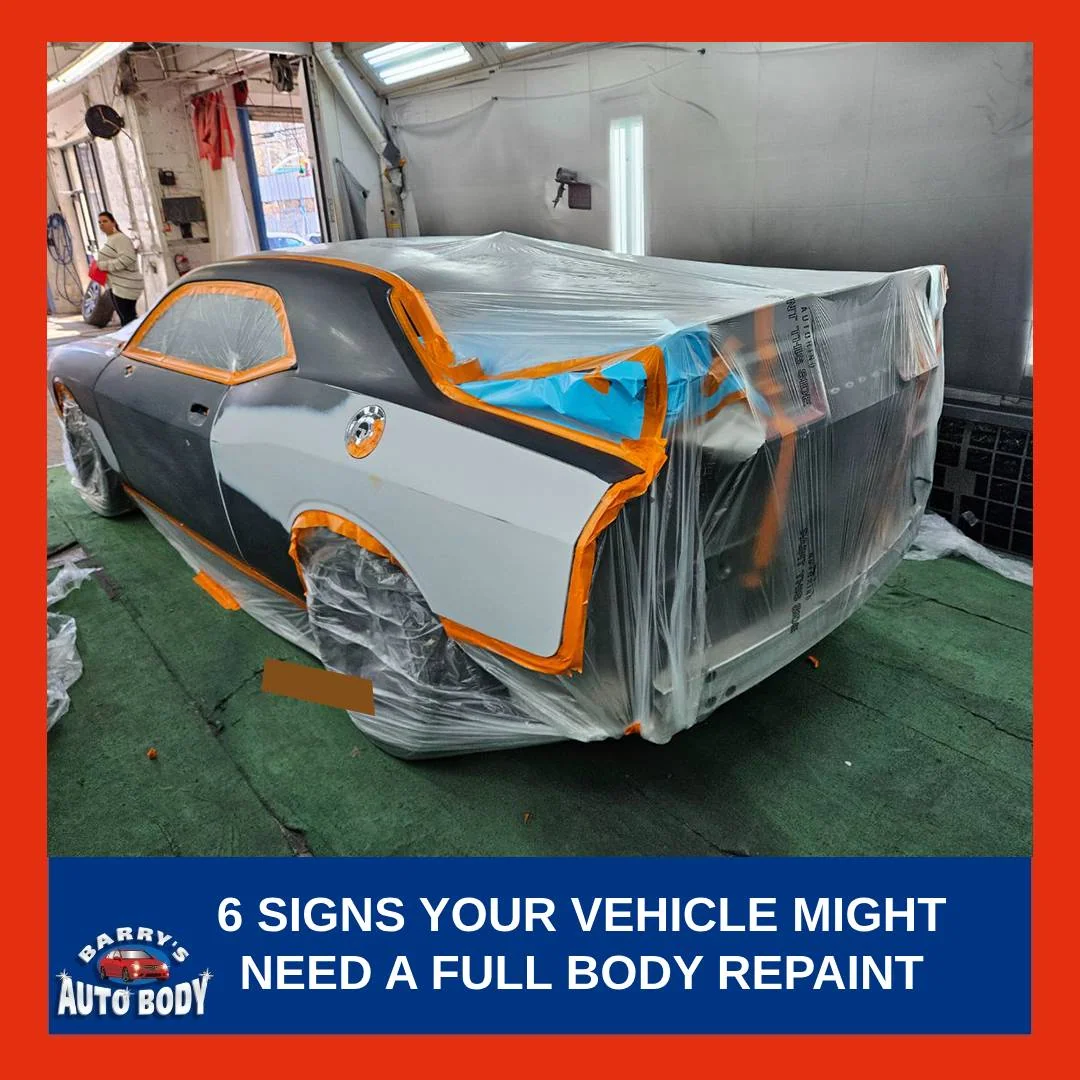Your car’s paint does more than make it look good—it protects the body from rust, weather damage, and wear. Over time, however, your vehicle’s exterior may show signs of needing a refresh. Knowing when a repaint may be necessary can save you time, money, and further damage. Here, we’ll explore six common signs that your vehicle may need a full body repaint and potential solutions.
Fading or Dull Paint
What Causes Fading?
Exposure to UV rays, pollution, and weather elements can wear down a car’s paint over time. Fading often happens gradually, making it easy to overlook until the color looks noticeably dull or uneven.
How to Spot It
- The car’s surface appears chalky or has a matte finish instead of glossy.
- Colors, especially darker ones, may lose their vibrancy.
Why It Matters
Fading indicates the protective layer of your car’s paint is breaking down. Without this layer, the car’s body becomes more susceptible to damage like rust.
What to Do
While waxes and detailing products can sometimes restore minor fading, professional repainting can be a good option for severe cases. A body shop can assess the extent of the damage and recommend whether a full repaint is necessary.
Visible Rust Spots
What Causes Rust?
Rust occurs when the metal underneath your car’s paint is exposed to moisture. This can happen due to scratches, chips, or cracks in the paint.
How to Spot It
- Orange or brown patches on the car’s surface.
- Bubbling or flaking paint in areas where rust is forming.
Why It Matters
If left untreated, rust can spread and compromise the structural integrity of your vehicle.
What to Do
Rust removal followed by a professional repaint can stop rust from spreading. Auto body shops often include rust treatment as part of a repainting service to ensure your vehicle is properly protected.
Multiple Scratches and Chips
What Causes Scratches?
Road debris, car doors in parking lots, and minor accidents can lead to scratches and paint chips. Over time, these minor damages can accumulate, affecting the car’s appearance.
How to Spot It
- Visible scratches that go beyond the clear coat and into the base coat or metal.
- Multiple chips clustered around high-impact areas like the front bumper or doors.
Why It Matters
Scratches and chips leave the underlying metal exposed to moisture and air, which can lead to rust formation.
What to Do
Touch-up paint can work for minor damage, but extensive scratching may require a full repaint. A professional body shop can ensure the new paint layers are applied evenly for a seamless look.
Peeling Paint or Clear Coat
What Causes Peeling?
Over time, exposure to harsh weather, chemicals, and improper maintenance can cause the clear coat to separate from the paint layer.
How to Spot It
- Flaking or peeling sections of paint.
- Exposed primer or base coat underneath the peeling areas.
Why It Matters
Peeling paint affects your car’s appearance and compromises its protection. Without a proper paint layer, the body is exposed to environmental damage.
What to Do
Professional repainting is often the best option for peeling paint. A body shop can remove the damaged layers and apply a new coat to restore your car’s exterior.
Inconsistent Paintwork After Repairs
What Causes Mismatched Paint?
After a repair, it can be challenging to match the new paint to the existing color perfectly. This can leave your car looking patchy or uneven.
How to Spot It
- Noticeable texture, gloss, or color differences between repaired and original areas.
- Uneven blending, especially under direct sunlight.
Why It Matters
Inconsistent paintwork can diminish your car’s resale value and overall aesthetic.
What to Do
A whole-body repaint can resolve mismatched paint issues by providing a uniform finish. Auto body professionals use advanced color-matching technology to achieve a consistent look.
Signs of Aging or Neglect
What Causes Paint Aging?
Even well-maintained vehicles can show signs of wear over time. Factors like sun exposure, improper cleaning, and general use contribute to aging paint.
How to Spot It
- Cracked or discolored paint.
- Thin paint layers where the primer may be visible.
Why It Matters
Aged paint is less effective at protecting your car from rust and weather damage.
What to Do
Repainting can rejuvenate your car’s appearance and restore its protective barrier. Seeking advice from an auto body specialist can help determine whether a full repaint is warranted.
Your car’s paint does more than make it look good; it protects against environmental damage and wear. Recognizing signs like fading, rust, or peeling can help you take proactive steps to protect your vehicle.
Consulting with a professional auto body shop can be a smart choice for most of these issues. Professionals have the tools, expertise, and materials to assess your car’s condition and recommend the best action.
Whether restoring faded paint, removing rust or fixing mismatched repairs, a full-body repaint can give your vehicle a new lease on life while preserving its value.
Investing in your car’s paintwork is an investment in its longevity and appearance. A trusted auto body specialist can guide you through the process and ensure your vehicle gets the care it deserves.

